| Srl | Item |
| 1 |
ID:
118386
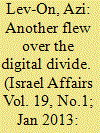

|
|
|
|
|
| Publication |
2013.
|
| Summary/Abstract |
This article is part of a pioneering study which analyses Internet usage by some 600 candidates for heads of 156 local authorities in Israel in the municipal campaigns of 2008. Despite the importance attributed to the municipal elections in the Arab-Palestinian sector in Israel, the high turnout rate, the competitiveness of the elections and the continuing penetration of the Internet, it was scarcely used by candidates, compared to about 50% usage by candidates who competed in municipalities with Jewish populations. Interviews suggest that beyond access gaps, additional obstacles impede the usage of the Internet as an effective political tool in the Arab-Palestinian sector.
|
|
|
|
|
|
|
|
|
|
|
|
|
|
|
|
| 2 |
ID:
118385
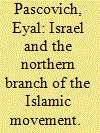

|
|
|
|
|
| Publication |
2013.
|
| Summary/Abstract |
The Israeli Islamic Movement's Northern Branch and its leader Sheikh Ra'id Salah pose a complex and multi-dimensional challenge for the State of Israel: political, national, socioeconomic and religious. Its most prominent manifestation is the movement's striving for separatism and open defiance of Israel's Jewish character. The government has sought - with limited success - to draw 'red lines' for the movement and its leaders and its occasional threats of harsher measures, including outlawing the movement, have failed to achieve the desired result.
|
|
|
|
|
|
|
|
|
|
|
|
|
|
|
|
| 3 |
ID:
118382
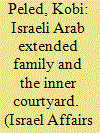

|
|
|
|
|
| Publication |
2013.
|
| Summary/Abstract |
This article presents significant transformations in the social history of the Israeli Arab extended family as reflected in the architectural history of the inner courtyard - once the focal point of the extended family's economic and social life. The article places this socio-architectural perspective within its broad political, economic and demographic contexts. As an interdisciplinary study in the sociology of space, it weaves together anthropological insights regarding social structures and processes and geographical explanations of the rapid changes in the landscape of Israeli Arab villages, towns, and cities.
|
|
|
|
|
|
|
|
|
|
|
|
|
|
|
|
| 4 |
ID:
118383
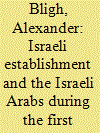

|
|
|
|
|
| Publication |
2013.
|
| Summary/Abstract |
It is impossible to assess the Israeli government activity vis-à-vis the Israeli Arabs during the 1987-92 uprising in the West Bank and Gaza as a success. In terms of policies of active initiative, there were none. Two ministers did take active measures in addressing the development gaps, but that did not deal with the issue of preventing the emergence of a de facto Israeli Arab autonomous system. In shaping passive policies, the response was far from conveying the message to the Israeli Arabs that as full Israeli citizens they were expected to keep a distance from organizations dedicated to the destruction of the Jewish state.
|
|
|
|
|
|
|
|
|
|
|
|
|
|
|
|
| 5 |
ID:
118387


|
|
|
|
|
| Publication |
2013.
|
| Summary/Abstract |
This article discusses the 2003 plan to combine local authorities in Israel and its implementation. In the framework of this plan, 28 local authorities were unified into 12 authorities, including some in the non-Jewish sector, so as to reduce government expenditure and to enable the local authorities to function more efficiently. This article will show that while unification did not always achieve its goals, in nearly all the unified Jewish municipalities that did succeed success was outstanding; by contrast, all unifications in the non-Jewish sector failed.
|
|
|
|
|
|
|
|
|
|
|
|
|
|
|
|
| 6 |
ID:
118384
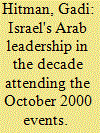

|
|
|
|
|
| Publication |
2013.
|
| Summary/Abstract |
This main thesis of this article is that while there is a general unanimity among Israel's Arab parties and/or organizations on national issues and the desired solution to the Palestinian problem, there are wide divergences in their positions on civil matters and the consequent need for a dialogue with the Israeli government and Jewish society. A governmental policy that encourages integration rather than exclusion can therefore minimize the tension between this sector and the state and neutralize potential sources of friction.
|
|
|
|
|
|
|
|
|
|
|
|
|
|
|
|
| 7 |
ID:
118379
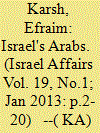

|
|
|
|
|
| Publication |
2013.
|
| Summary/Abstract |
The violence wrought by Israel's Arabs on their Jewish compatriots in October 2000 was not an act of social protest as wrongly claimed by the Orr commission, but rather an internal uprising in support of an external attack. Just as the leader of the Palestinian Arabs during the mandate era, Hajj Amin Husseini, dragged his reluctant constituents into a disastrous conflict that culminated in their collective undoing, and Yasser Arafat used the Oslo accords to implicate his equally grudging subjects in the worst military confrontation with Israel since the 1948 war, rather than create the independent Palestinian state envisaged by the accords, so Israel's Arab leaders radicalized their community for decades. The more prosperous, affluent, and better educated the Israeli Arabs have become, the greater has grown their leadership's incitement against their state of citizenship, to the point where many ordinary Arabs have come to openly challenge the fundamental principles underpinning its very existence.
|
|
|
|
|
|
|
|
|
|
|
|
|
|
|
|
| 8 |
ID:
118389
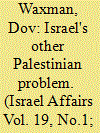

|
|
|
|
|
| Publication |
2013.
|
| Summary/Abstract |
This article examines the challenge Israel faces from its Palestinian minority in light of the publication of the 'Future Vision Documents', a series of seminal documents written by leaders of the Palestinian community in Israel in which they demand that Israel abandon its Jewish identity and recognize its Palestinian citizens as an indigenous national minority with collective rights. The article also assesses the implications of this challenge for the two-state solution to the Palestinian problem.
|
|
|
|
|
|
|
|
|
|
|
|
|
|
|
|
| 9 |
ID:
118381
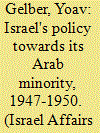

|
|
|
|
|
| Publication |
2013.
|
| Summary/Abstract |
In the absence of preconceived strategies - despite several pre-state attempts to prepare blueprints for tackling the Arab problem - Israel's early Arab policy was shaped in a process of trial and error, fluctuating between ideological aspirations and good intentions (or wishful thinking) and the needs on the ground: the 1948 war and its consequences, the wide-open borders and regular infiltration, and the fear of a second comprehensive war with the Arab states.
|
|
|
|
|
|
|
|
|
|
|
|
|
|
|
|
| 10 |
ID:
118388
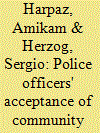

|
|
|
|
|
| Publication |
2013.
|
| Summary/Abstract |
Police racism and prejudice against minorities are believed to impede law enforcing agencies' ability to equitably perform their job. One factor driving police forces throughout the world to adopt community policing was their will to ameliorate relations with minority groups. In the Israeli case, a survey of 643 police officers and police managers reveals that positive attitudes towards community policing correlate with positive attitudes towards Arab citizens. This article discusses these findings and their implications.
|
|
|
|
|
|
|
|
|
|
|
|
|
|
|
|
| 11 |
ID:
118380
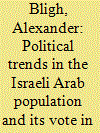

|
|
|
|
|
| Publication |
2013.
|
| Summary/Abstract |
Full Arab Israeli involvement in the national political system is disappearing from the Israeli political scene. A parallel system is being developed by the community's political leaders. Within this new structure, national elections and the Knesset are viewed as marginal; they serve mainly as a PR arena intended to bring the Arab Israeli message to Jewish/Zionist awareness. Judging from the evidence of recent election results among Arab voters, it is possible to cautiously conclude that the Israeli Arab political stance is less and less a part of the general Israeli political culture.
|
|
|
|
|
|
|
|
|
|
|
|
|
|
|
|